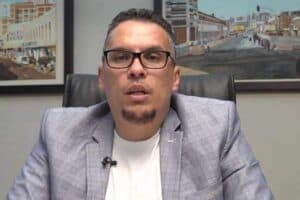Sierra Leone's opposition candidate Julius Maada Bio on Sunday accused outgoing leader Ernest Bai Koroma of attempting to derail Tuesday's presidential run-off through the courts to keep his party in power.
The High Court on Saturday ordered the National Electoral Commission (NEC) to halt preparations for the vote until an election fraud complaint lodged by a lawyer linked to the ruling party is resolved.
Bio, who won the March 7 first round by a slim margin for the Sierra Leone People’s Party (SLPP), is due to run against Koroma’s hand-picked successor, Samura Kamara, who will represent the ruling All Peoples’ Congress (APC).
“The motivation behind the APC injunction is very clear: they do not want a runoff presidential election to proceed because they know the verdict of the overwhelming majority of Sierra Leonean electorate will not be in their favour,” Bio told a press conference.
He said Koroma would bear responsibility “for anything that follows after” a delayed or cancelled election, before evoking fears of “large-scale violence and ethnic cleansing”.
The APC broadly relies on the Temne and Limba people in its northern strongholds, while the SLPP is more popular in the south with the Mende ethnic group.
– Bitter campaigning –
Some candidates and supporters have used ethnic slurs at campaign rallies, and the police and international observers have raised concerns over such rhetoric in recent weeks.
Bio further urged Koroma to “allow the conduct of the runoff presidential election to proceed as scheduled and accept the results of the election,” adding the president would bring Sierra Leone “to the brink of chaos” if he failed to step down at the end of his mandate on March 27.
Koroma has served a maximum of two terms, but raised eyebrows last year when he said he would stay on as party chairman of the APC once he leaves the presidency.
The SLPP candidate, who briefly served as head of state in a 1996 junta government, alleged the president wanted to provoke violence in order to call a state of emergency and rule by decree.
Sierra Leone emerged from a brutal civil war in 2002 and has remained largely peaceful since then, despite occasional flare-ups around election time, but memories of a conflict in which more than 50,000 died remain potent.
A group of civil society organisations said Saturday the court decision was “frustrating and depressing”, as the March 7 vote was declared credible by national an international observers.
“We expect our judiciary to correct its past,” the group said in a statement, evoking a post-war truth and reconciliation commission statement that condemned judges for “failing to stand up to state tyranny”.






